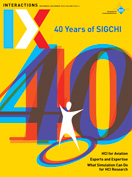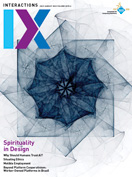Authors:
Kentaro Toyama
Cyberbullying, Internet addiction, job elimination, the destruction of democracy. Digital technology has never before been accused of causing so much harm; the backlash is severe against the contrast of tech's early utopian promises.
→ Enlightenment values, of which the digital arguably represents a culmination, tend to focus on external outcomes.
→ External values have improved external life for some of the world, but they have also caused deep, widespread problems, and digital technologies have contributed to them.
→ Religion and spirituality's focus on internal values may be what we need to mitigate the undesirable outcomes of technology.
Much of the criticism has placed the fault with capitalism. Large-scale systems of surveillance and control are increasingly imposed on us by tech companies. Pervasive advertising distracts us from our self-chosen goals while encouraging us to buy things we do not need. Gig-economy platforms reinforce inequitable class boundaries between service providers and consumers. In fact, an argument can be made that digital technology is the latest, most effective expression of capitalism.
Capitalism, however, has its roots in the European Enlightenment, and so attributing technology's faults to capitalism only raises the question: What is the deeper cause?
I suggest that the deeper cause of our technological malaise could be an excessive focus on external outcomes; and if so, an inward turn as prompted by faith and spirituality could offer a route to recovery. The core principles of the Enlightenment inclined us to focus on the external: external facts, external actions, external objects, and external outcomes. On the one hand, this focus resulted in unprecedented growth in power, knowledge, health, and wealth for many of us. On the other hand, it also appears to be dooming us to inattention, inequality, conflict, and possibly extinction. The Enlightenment's shedding of religion discarded a potent force that focused people's attention on their inner lives; now might be a time to reconsider the value of inward attention.
 The External Focus of the Enlightenment
The External Focus of the Enlightenment
Scholars often place the origins of our modern, technological world in the Enlightenment of the 17th and 18th centuries. Combining several forces that had been brewing earlier in Europe into a powerful movement, the Age of Enlightenment resulted in the Industrial Revolution and the rise of liberal democracy. There is consensus that Enlightenment ideals were woven from several intellectual threads emphasizing reason and empirical knowledge, individual liberty, and the willingness to question existing forms of power, whether religious, political, or natural. These threads underlie the Enlightenment's emphasis on science, personal happiness, representative government, and religious tolerance, which in turn gave way to technology, democracy, capitalism, and secular humanism. Today's digital world epitomizes Enlightenment principles.
Of all that could be said of Enlightenment values, however, I focus on their external nature. Science, for example, is explicit that its findings follow from objectively observable—i.e., external or externalized—phenomena; and technology is a further externalized demonstration of its principles. Secular humanism demands that morality be based on reasoning that can be considered and verified by others; a morality based on private visions or opaquely determined dictates is dogma. Modern conceptions of happiness, meanwhile, tend to rest on components such as health, wealth, social relationships, and individual empowerment—all external things, especially when contrasted with, say, the internal union with the divine. And a key element of democracy is transparency, the requirement for externally observable processes that enable all citizens to participate in decision making.
In moral philosophy, the external focus of the Enlightenment led to the triumph of consequentialism—the view that morality should be determined by that which leads to the best outcomes—over alternatives such as deontological or virtue ethics, which are more inwardly focused. Utilitarianism, the most common form of consequentialism, was espoused by Enlightenment thinkers such as Jeremy Bentham and John Stuart Mill. Today, utilitarianism runs deep as a justification for capitalism as it is practiced globally, and especially with respect to digital technology.
It should be acknowledged that the external focus of Enlightenment values has brought tremendous benefits. Prior to 1800, life expectancy around the world was generally below 35 years; today, it is 72 years. In 1800, global gross domestic product per capita was perhaps $1,000 in today's dollars; today, it is $18,000. Today, many people have access to the technologies of air-conditioning, anesthesia, flight, and the Internet—all technologies unavailable even to kings and queens in 1800. The Enlightenment has led to dramatic improvement in our external lives, perhaps exactly because of its external focus.
One way to understand the forces that led to our digital age is to consider who is hailed within it: Jeff Bezos, Steve Jobs, Elon Musk, Mark Zuckerberg. They command immense wealth and power. They are known for their technological feats and entrepreneurial intelligence. They seek to expand humanity's external capabilities through robotics, remote communication, and space exploration. In effect, they are as much outsize representatives of Enlightenment values as they are giants of the tech world.
But they are also increasingly criticized for their excesses, both as individuals and as members of the larger digital society they represent. Whatever good the Enlightenment has brought us, it is not without its flaws.
If Enlightenment values are externally focused, and the culmination of those values in our digital world is curdling, then a potential corrective is inward examination.
I suggest such inward examination is most consistently championed by faith and spirituality, in at least three ways. First, religion often contains an explicit denunciation of external obsessions such as physical health, material wealth, professional accomplishment, or social standing. Jesus Christ said, "It is easier for a camel to go through the eye of a needle, than for a rich man to enter into the kingdom of God" (Mark 10:25). The Koran says, "You shall not attain righteousness until you spend out of what you love (in the way of Allah)" (3:92). The most spiritual give up all worldly things: Saint Francis was born to a wealthy merchant family, but as a monk committed to a life of extreme poverty. The Buddha renounced his family and kingdom to seek enlightenment.
Second, and related, religion promotes the focusing of attention inward. Prayer, for example, perhaps the most universal of religious practices, is a complex, multilayered act, in that it often suggests an attempt to communicate with another entity, but the very absence of a corporeal respondent inevitably draws attention inward, through an inner communion with either oneself or the entity. Another example is religious fasting, among whose many objectives is the internal redirection of attention. Then there are practices such as meditation and contemplation, arguably the exemplars of inner focus. Eastern religions, such as Hinduism and Buddhism, consistently emphasize inward attention in their meditative practices, and the Abrahamic traditions have analogues such as Christian contemplation, Jewish Kabbalah, or Sufi mysticism. The Trappist monk Thomas Merton captured this element of interiority when he said, "Our real journey is interior; it is a matter of growth, deepening, and an ever greater surrender to the creative action of love and grace in our hearts" [1].
The Enlightenment's shedding of religion discarded a potent force that focused people's attention on their inner lives; now might be a time to reconsider the value of inward attention.
Third, religion and spirituality have a consistent focus on personal moral growth independent of external consequences. That faith has much to say about morality is clear, starting with "Thou shalt not kill." And there is some evidence that religious people are more prone to prosocial behavior than the nonreligious, though the evidence is mixed and qualified [2]. But of course, morality is not the sole province of religion—staunch atheists are certainly also capable of moral reasoning and action.
What is arguably unique to religion and spirituality is their insistence on a particular form of moral growth in which inner intention is weighted more than external consequences. Thus, in the Bible, Jesus says, "Ye have heard that it was said by them of old time, Thou shalt not commit adultery: But I say unto you, that whosoever looketh on a woman to lust after her hath committed adultery with her already in his heart" (Matt. 5:27–28). A similar sentiment was expressed by the Buddha: "Whatever an enemy may do to an enemy, or haters, one to another, far worse is the harm from one's own wrongly directed mind" (Dhammapada 42). In other words, the internal state of mind should be the primary focus of moral attention [3]. These are dramatic repudiations of Enlightenment consequentialism.
 The Inward Turn for Technology
The Inward Turn for Technology
What might an inward turn do for our digital age? Religions have explicit ideas about when technology should not be used. For example, in forms of Islam that prohibit recreational music or interaction between unrelated/unmarried people of the opposite sex, social media is frowned upon [4]. A study of advanced meditators suggests that, while they are open to using digital tools for seeking information and for communication, they see little value in digital assistance for meditation itself [5].
Our troubles with digital technology today are profound. Technology is accused of a growing mental health crisis, threatening livelihoods at large scale, and eroding democracy. These are existential problems, yet we seem blithely willing to allow the same technologies to proliferate unchecked. This is an internal conflict that can only be resolved with deep inward reflection. If we heard and heeded our inner voices, I suspect many of us would acknowledge that we are giving too much of our attention to virtual worlds. We would unplug (more often, anyway), and help others unplug as well.
Technology nonuse, of course, is not the only point of an inward turn. A more subtle goal might be what Buddhists call "skillful means" applied to technology. As one expert meditator suggested, "My use of technology for work or for surfing the Internet or whatever…is a place of struggle for bringing the [inward] practice informally there" [5]. Technology, interpreted in this way, presents a site for inner development. From a religious perspective, this is unremarkable, but for the nonreligious, this is a novel possibility: to see every digital interaction as an opportunity to reflect, and to use each digital moment to express the values one aspires to.
An inward turn thus raises a broad range of questions for technology users and designers, as individuals and societies. Could technologies be designed to prompt inner reflection? Can users be trained to listen better to their inner voices with respect to tech use? Are there policy levers to encourage inward attention? What would happen if society judged technology based on its enabling of reflection and compassion? If the founders of various faiths were alive today, what would they say about our digital world?
There are many possible objections to my thesis, and I consider three.
The first is the easiest to refute: Great harms have been caused in the name of religion, so what could we possibly gain from it? This point is often made in reference to various atrocities (e.g., the Crusades, Israeli apartheid, Islamic extremism, Burmese genocide), or by religious tribalism as Joyojeet Pal suggests in another Dialogue article in this issue (page 46). But it is not as if being nonreligious is any guarantee of decency (cf. Stalin, the Khmer Rouge, atheist Internet trolls). Wholesale rejections of religion are often based on a simplistic view of it, as if Florence Nightingale, Mahatma Gandhi, and Nelson Mandela were cut from the same cloth as al-Qaeda or the Ku Klux Klan. One corrective to such stereotyped views, especially for secularists, is James Fowler's "stages of faith" framework, which proposes there are many ways in which people, including atheists, can be spiritual [6]. Throwing out all spirituality on the basis of fundamentalism robs us of what we might learn from a Mother Theresa or a Dalai Lama, or from the kinds of faith-inspired principles that Jessica Hammer and Samantha Reig, as well as Alexis Hiniker and Jacob Wobbrock, highlight elsewhere in this section (pages 30 and 40).
A second objection comes from the religious, that this article's thesis is no different from their standing criticism of nonbelief. My argument aligns with other calls to reconsider faith, but it differs in key respects. First, I do not claim that the adoption of any particular religion is necessarily the solution. What I suggest instead is that religion and spirituality should be respected for their profound ability to focus whole populations on their inner life and intrinsic growth. We have something to learn from that. Philosopher Alain de Botton [7] argues similarly, suggesting that specific religious practices may have value to atheists. Second, my argument rests firmly on inward attention as the crux for our digital age. While theologians might acknowledge religion's interiority, rarely do they make much of it for nonbelievers. They instead focus on the value of a Supreme Being, karma, or the afterlife for enforcing goodness; or religion's consolations for despair, suffering, and death; or religion as immunity to nihilism; or sometimes, simply, that one faith is The Truth. Whatever religion's claims about its value, what I am highlighting is its ability to turn attention inward.
A third objection is the secularist's claim that humanism fills exactly the void I mention, and that an inward focus is not limited to those who are explicitly spiritual. Of course, religion and spirituality do not have a monopoly on inwardness. Committed atheists can be deeply concerned with their inner life and prioritize inner growth. The moral philosopher Peter Singer, for example, appears to be such a person—he thinks deeply about personal morality and tries to act in accordance with his values through a charitable foundation and substantial personal giving [8].
But Singer is arguably the exception that proves the rule—a minor character in the huge shadow of the Musks and Zuckerbergs of our world. Where are today's Gandhis and Nightingales? Whether because they are extremely rare, or because the larger society fails to notice them, we would probably do well with a turn away from stuff and status, to focus more on what is, and could be, within.
Underlying my argument is a philosophical claim that any set of values that is not focused on inner growth—in reflective ability, in moral capacity, in self-understanding—is bound to an expiration date. Maximizing external goods and outcomes eventually meets with the limits of a finite Earth. If we could factor in all future external consequences into the calculus behind our actions, we might not need interiority, but a horizon out to eternity is impossible to grasp. What an inward turn does is to decouple, just enough, the inner cause of goodness from its consequences, so that we are always aiming for ideals whose fruits we may never see ourselves, but which are important nonetheless.
This view aligns with the moral philosophy of virtue ethics [9], which suggests the real focus of moral thought and action should be on inner betterment and growth in our ability to act well. An inward turn, as perhaps inspired by religion and spirituality, could counter technological excess and corruption.
1. Shannon, W.A. Silent Lamp: The Thomas Merton Story. Crossroad, 1992.
2. Brooks, A.C. Religious faith and charitable giving. Policy Review 121 (2003), 39.
3. I do not believe such guidance intends practitioners to ignore consequences, especially in the context of other religious injunctions that praise charitable action and discourage harm to others. Rather, what these passages suggest is that avoiding negative external outcomes is insufficient; internal thoughts and intentions should also be attended to, arguably as the primary focus.
4. Rifat, M.R., Chen, J., and Toyama, K. Money, God, and SMS: Explorations in supporting social action through a Bangladeshi mosque. Proc. of the 2017 SIGCHI Conference on Human Factors in Computing Systems. ACM, New York, 2017; https://dl.acm.org/doi/abs/10.1145/3025453.3025960
5. Markum, R.B. and Toyama, K. Digital technology, meditative and contemplative practices, and transcendent experiences. In Proc. of the 2020 SIGCHI Conference on Human Factors in Computing Systems. ACM, New York, 2020, 1–14; https://doi.org/10.1145/3313831.3376356
6. Fowler, J.W. Stages of Faith: The Psychology of Human Development and the Quest for Meaning. Harper & Row, 1981.
7. de Botton, A. Religion for Atheists: A Non-believer's Guide to the Uses of Religion. Vintage, 2012.
8. Ironically, Singer espouses an extreme, externally focused consequentialism, but that does not contradict his internal focus. Inward attention may not lead everyone to the same place. Singer is reported to not be religious.
9. Hursthouse, R. On Virtue Ethics. Oxford Univ. Press, 1999.
Kentaro Toyama is W. K. Kellogg Professor of Community Information at the University of Michigan School of Information, a fellow of the Dalai Lama Center for Ethics and Transformative Values, and author of Geek Heresy: Rescuing Social Change from the Cult of Technology. [email protected]
Copyright held by author. Publication rights licensed to ACM.
The Digital Library is published by the Association for Computing Machinery. Copyright © 2022 ACM, Inc.






Post Comment
No Comments Found